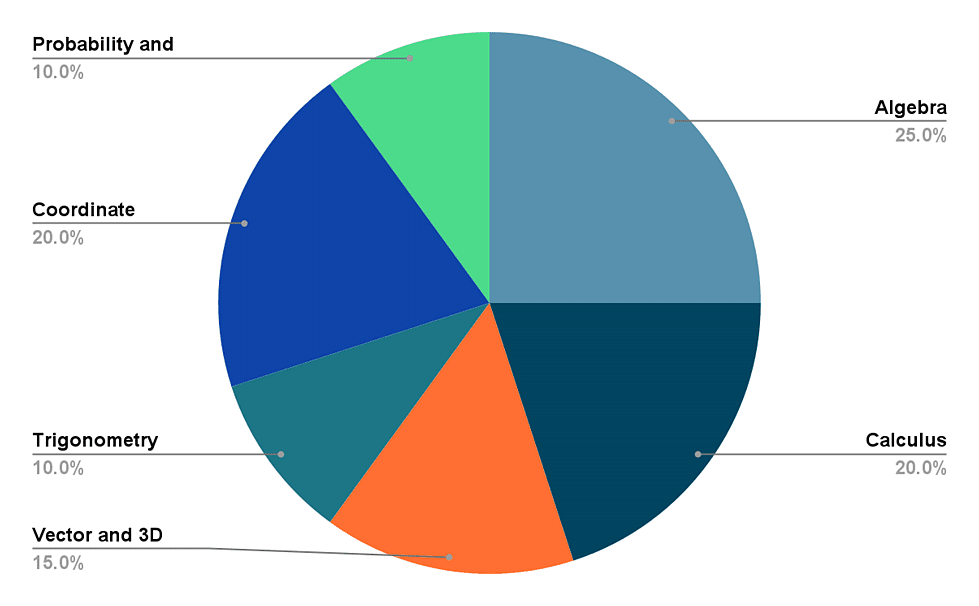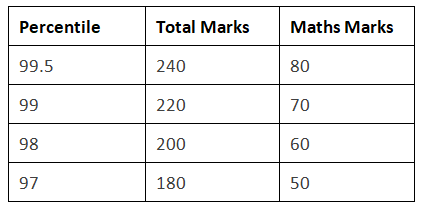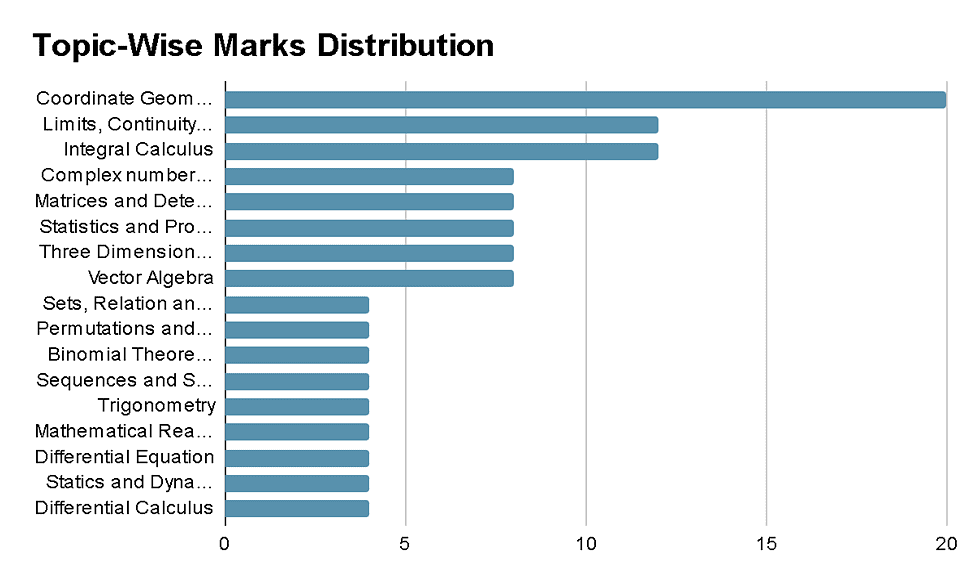JEE Exam: Overview
The Joint Entrance Examination (JEE) is an engineering entrance assessment conducted for admission to various engineering colleges in India. It is constituted by two different examinations: the JEE-Main and the JEE-Advanced.
JEE Main 2025 is generally conducted for three groups of aspirants:
- Paper 1 is for students aspiring to take up B.E. or B. Tech. courses.
- Paper 2A is for students aspiring to take up B. Arch. course.
- Paper 2B is for students aspiring to take a B. Planning course.
In paper I, each subject will contain two sections. Section A will be of Multiple-Choice Questions (MCQs), and Section B will contain questions whose answers will be filled in as a numerical value. In Section B, candidates must attempt five questions out of 10. There will be a negative marking for Section B as well.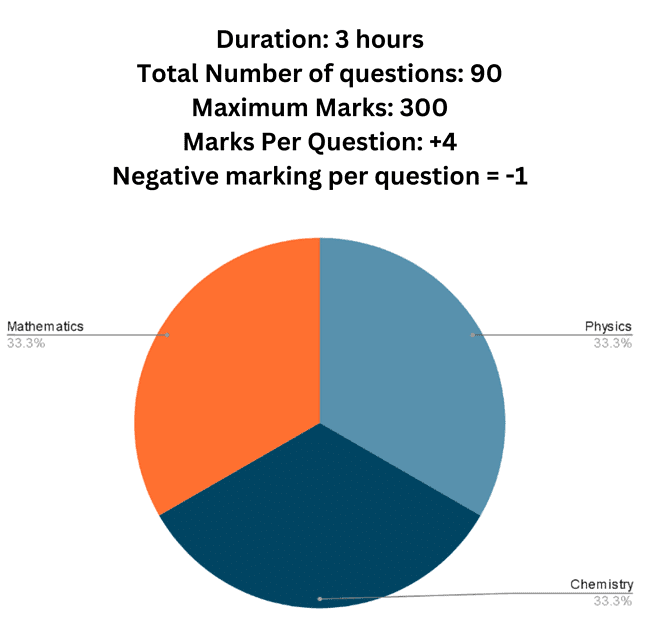

*Each Subject will have two sections. Section A will be of Multiple-Choice Questions (MCQs) and Section B will contain Questions whose answers are to be filled in as a numerical value. In Section B, candidates have to attempt any 05 (five) questions out of 10. There will be negative marking for both Section A and Section B. For each question in Section B, a candidate has to enter the correct integer value of the answer using the mouse and the on-screen virtual numeric keypad in the place designated to enter the answer. For Section B, the answer should be rounded off to the nearest integer.
JEE Maths: Weightage in JEE Exam
Mathematics is the most important subject and carries a significant weightage in both JEE Main and JEE Advanced. It is interlinked with other subjects in JEE, particularly physics and chemistry. Physics, for example, heavily relies on mathematical concepts such as calculus, differential equations, and vector algebra, to understand and analyze physical phenomena. Similarly, in Chemistry, mathematical concepts such as logarithms, permutations, and combinations are used to solve problems related to chemical reactions and equilibrium.
Additionally, Mathematics plays a crucial role in engineering. It is used to model and analyze complex systems, design and optimize components and structures, control and automate processes, and communicate and visualize information.
JEE Maths Syllabus 2025
The JEE Maths syllabus covers a wide range of mathematical concepts and topics, including algebra, trigonometry, geometry, calculus, and more. The syllabus is designed to test the student's understanding of the fundamental principles of mathematics and their ability to apply them to solve complex problems.
For the reference of students preparing for JEE Main 2025, the Syllabus for Maths subject is provided below.
Unit No | Topic’s Name |
1. | |
2. | |
3. | Matrices and Determinants |
4. | |
5. | |
6. | |
7. | |
8. | |
9. | Integral Calculus: Definite and Indefinite Integral |
10. | |
11. | |
12. | |
13. | |
14. | |
15. | |
16. |
Click here to view the detailed syllabus for JEE Main Maths 2025.
JEE Mains Chapter Wise Weightage for Maths
The syllabus for mathematics in the Joint Entrance Examination (JEE) covers various topics from algebra, trigonometry, geometry, and calculus. The weightage of each topic in the JEE may vary from year to year.
The general weightage of topics covered in JEE Main Mathematics is as follows: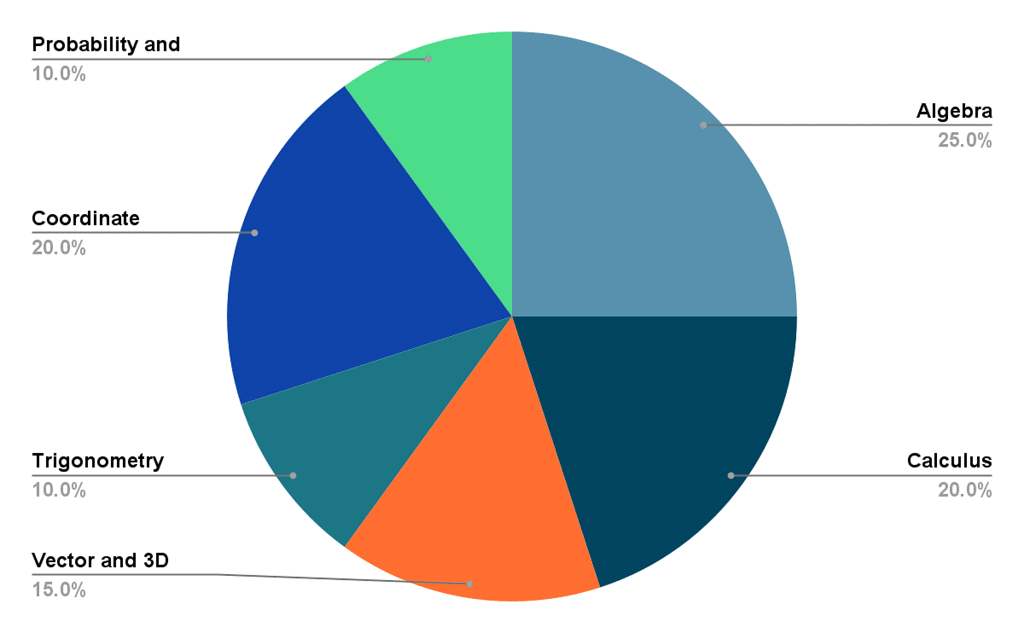
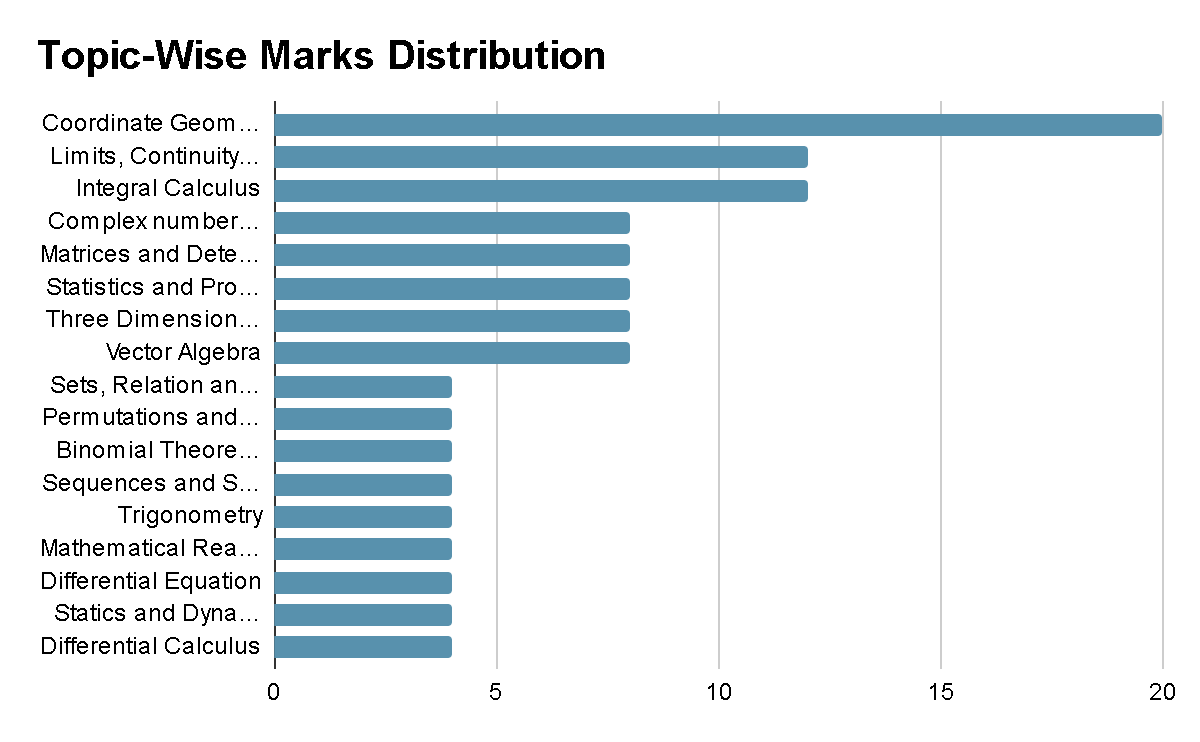
From the above data, we can conclude that topics like Coordinate Geometry, Limits, Continuity and Differentiability, and Calculus have a higher weightage compared to other topics. These topics require a deeper understanding of mathematical concepts and are heavily tested in competitive examinations.
For an in-depth understanding of the topic-wise and chapter-wise weightage of JEE Main Maths, along with the types of questions asked in the exam from each topic, refer to this article or the video by EduRev expert on "Most Important Topics for JEE Main Maths".
JEE Preparation Tips for Maths
1. Stay organized and manage your time: Now, the question arises “How many hours should I study maths for JEE?”. Here is a well-explained answer to it:
- The study timings
- Topics to be covered
- The difficulty of Topics
- Time allotted for each Topic
- Deadline for the revision
Pro Tip: You can use various apps available on your device to make an alarm-based study plan.
2. Clear your basics: You should have a good understanding of the topic before attempting any questions. Using the wrong formula or applying it to the incorrect situation can lead to inaccurate or unreliable results. In order to avoid these mistakes, you must have a thorough understanding of the problem you are trying to solve, to really excel in the JEE Maths section, it's important to understand the logic behind each problem.
Here is a list of topics that can help you build a strong foundation and provide you with a shortcut to solve problems in various topics.
- Inequalities
- Quadratic equations
- Functions (Domain and Range)
- Graphing (How to graph a function)
- Sequence and series
- Trigonometric Functions and Identities
- Logarithms
- Limits and Derivatives
- Coordinate Geometry: Distance formula, Midpoint formula, and the slope of a line.
3. Always begin with NCERT
After you have understood the topics thoroughly, make sure to start practicing questions through NCERT and NCERT Exemplar after the completion of every topic. NCERT textbooks are considered a good starting point for JEE math preparation because they provide a solid foundation in the concepts and principles that are tested in the JEE Exam.
EduRev offers comprehensive summaries and solutions for each chapter of the NCERT Exemplar Problems, saving you time and effort in searching for NCERT Exemplar solutions online.
4. Mastering the Art of Practising
Here are the complete instructions to help you structure your daily practice for success:
- Practice from a reference book after completing the NCERT. Make sure to mark the questions which are difficult or have a new approach.
- Test yourself after completing a chapter or a topic by practicing the questions marked by you in the book.
- Practise as many mock tests and practice series as possible to know about your strong and weak topics.
- Previous year questions are a great help in understanding the level and pattern of questions of any exam. It is a must to practice the PYQs of the chapter side by side after completing it.
On EduRev, you can retest the incorrect questions and the ones you left unanswered in a test. Moreover, you can easily identify your areas of strength and weakness, and compare your performance with other students.
5. Make short notes: Make short notes and a formula notebook side by side while studying a topic. These will help you revise the chapters within no time. Refer to them before practicing any problem.
EduRev provides an all-inclusive package of formula sheets that contains all the needed formulas, thus eliminating the need to make a separate formula notebook and saving you precious time.
Important: Along with the above preparation tips, here’s a video to help you effectively prepare for JEE Exam with the EduRev Infinity Package for JEE:
How to prepare for JEE with EduRev Infinity?
EduRev Infinity Package for JEE includes:
- Subject-wise Courses: Courses for all the 3 subjects: Physics, Chemistry, and Mathematics. Each course offers topic-wise video lectures, detailed notes & online tests for each topic.
- Guidance book and Revision Notes: With the EduRev Infinity access, you can have access to the NCERT Exemplar and JEE Revision Notes so that you can save time and effort in finding the best learning resources.
- Solutions for Reference Books: EduRev’s Infinity package for JEE also includes solutions for reference books like HC Verma, DC Pandey, and Irodov.
- Discussion forum: Along with the learning, you can get your doubts solved with the help of the discussion forum; the largest community of teachers and students to help you all the time.
- Previous Year Question Papers: You will get solved previous year question papers for Physics, Chemistry, and Mathematics, as well as topic-wise solved PYQs for JEE Mains and Advance which have appeared in the last 35 years.
- Daily Practice Problems: To get a better understanding of different types of questions, you can refer to the Daily Practice Problems for JEE Mains and Advanced available in EduRev’s Infinity package.
- Mock Test Series for JEE preparation: EduRev provides Mock Test Series for JEE Mains and JEE Advanced, which includes over 160 mock tests including part-test which helps you prepare particular topics better.
- Test Analysis: You will get a comprehensive analysis of the tests you attempted, with in-depth solutions to each question. You will also gain insight into your performance relative to other test-takers, with an All India Rank, to identify your strengths and weaknesses.
- Revision Material: EduRev offers comprehensive revision notes, formula sheets, mind maps, and PPTs for quick and easy last-minute revisions.
- Crash course: If you have limited time, EduRev also provides a crash course for JEE preparation with detailed and structured video lectures.
JEE Main Study Material for Maths
JEE Maths study material includes a variety of resources such as textbooks, lecture notes, online tutorials, PYQs, and practice problems. It is important to use high-quality materials that align with the JEE syllabus and exam format.
EduRev offers a comprehensive range of courses to help you prepare for the JEE Mathematics Section. Each course listed below is tailor-made to help you gain the knowledge, skills, and confidence required to succeed in the JEE Mathematics Section.
- Course on JEE Mathematics
- Crash course for JEE
- JEE Main & Advanced Mock Test Series
- Daily Practice Problems for JEE Mains / Advanced
- Maths 35 Years JEE Main & Advanced Past Year Papers
- NCERT Exemplar & Revision Notes for JEE
- Mind Maps for JEE
- All types of questions
- Formula Sheets for JEE
- Online MCQ Tests for JEE
- PPTs for JEE Preparation
- JEE Revision Notes
Best Books for JEE Maths
Here are some books/resources that are often recommended by IIT toppers for mathematics:
- Course in Mathematics for IIT JEE, Tata McGraw Hill publications
- Problems Plus in IIT Mathematics, A Das Gupta
- 35 Years Chapter-wise Solved Papers and Tests by EduRev
- Class 11th & Class 12th Mathematics, R.D. Sharma
- IIT Mathematics, M.L. Khanna
Topic Wise Books:
- Higher Algebra by Hall and Knight
- Problems in Calculus of One Variable by I.A. Maron
- Problems in Mathematics by V.K. Krishnamurthy and R.
- DPP for JEE Main and Advance by EduRev
- Calculus by Michael Spivak
- Trigonometry by S.L. Loney
- Coordinate Geometry by S.L Loney
- Differential Calculus by Shanti Narayan and P.B. Malik
- Integral Calculus by Shanti Narayan and P.B. Malik
Pro Tip:
For example, If you are studying Trigonometry:
- Step 1: Start from NCERT and NCERT Exemplar,
- Step 2: Complete the book exercises,
- Step 3: Practice basic questions from the Practice Problems offered by EduRev or by using a reference book like S.L. Loney.
- Step 4: Test and assess your understanding by giving topic-wise tests available in the JEE Mathematics course or with the help of books like ML Khanna.
EduRev has prepared the article on Best Books for JEE Maths providing a list of recommended books by IIT JEE Toppers along with a detailed description of the books and their authors.
JEE Practice Tests for Maths
Practice tests are an essential part of preparing for the exam. It gives candidates a better understanding of the type of questions that appears in the exam, enabling them to better prepare. Hence, it is recommended to take tests after completing a topic or a chapter to gain a better understanding of your knowledge on the topic.
At EduRev's exclusive course for JEE Mathematics, you can find 300+ tests that you can attempt after completing each chapter. Additionally, you can retake the questions that you answered incorrectly or left unanswered.
JEE Maths Previous Year Questions
PYQs are extremely important for preparing for the JEE Exam as they provide valuable insight into the type of questions that are likely to be asked in the exam. PYQs also help to improve the speed and accuracy of solving problems, which is crucial for the JEE which is a time-bound test, and also, helps to improve time management skills.
Pro Tip: After completing a chapter, practice its previous year's questions to gain a better understanding of the question pattern which is followed in the JEE Exam.
Hence, EduRev provides a wide collection of question papers for JEE Maths including year-wise and topic-wise papers so that candidates can access all of them in one place. JEE candidates need not visit separate pages for different questions.
JEE Mock Test Series
Mock tests are an important part of preparing for IIT JEE Exam. They provide students with an opportunity to practice taking the exam in a simulated environment, which can help them become more familiar with the format and structure of the actual examination.
Additionally, mock tests can help students identify areas where they need to improve and focus their studies. Overall, mock test series are an essential tool for preparing for competitive exams, as they can help students become more confident and well-prepared for the actual test.
EduRev provides Mock Test Series for JEE Mains and Advanced, which includes over 160 mock tests including part-test which helps you prepare particular topics better. Additionally, it provides you with the scorecard after each test by which you can identify your strong and weak points.
Frequently Asked Questions (FAQs) on JEE Maths
Is JEE Maths Hard?
The difficulty level of JEE math can vary depending on the individual student's level of understanding and preparation. Some students may find JEE math to be challenging, while others may find it manageable. It can be helpful to use a combination of textbooks, online resources, and practice problems to help you prepare. It is important to note that the JEE is a highly competitive exam and requires a significant amount of preparation and hard work to do well.
Can I crack JEE if I am weak in Maths?
Cracking JEE can be difficult if you are weak in math, as math is a significant component of the exam. However, it is not impossible. It will require a lot of hard work and dedication to improving your math skills, and you will likely need to put in more effort than someone who is stronger in math.
It is highly recommended that you start preparing well in advance, focus on your weak areas, and take the help of experienced teachers or tutors. Additionally, you may find it helpful to use additional study materials or take online courses to supplement your learning.
Keep in mind that JEE also includes Physics and Chemistry, so you can try to compensate for your weak math scores by getting good scores in other sections.
What topics are covered in JEE mathematics?
JEE mathematics covers a range of topics, including algebra, trigonometry, geometry, calculus, and differential equations. Here is the general weightage of topics covered in JEE Main Mathematics:
How is JEE mathematics different from school-level mathematics?
JEE mathematics is typically more advanced and covers a wider range of topics than school-level mathematics. It is also designed to test your ability to apply mathematical concepts and problem-solve, rather than just memorizing formulas and equations.
Is it possible to self-study for JEE mathematics?
Yes, it is possible to self-study for JEE mathematics. It can be helpful to use a combination of textbooks, online resources, and practice problems to help you prepare. It may also be helpful to work with a tutor or online assistance to get additional guidance and support.
How much time should I spend studying for JEE mathematics?
The amount of time you should spend studying for JEE mathematics will depend on your current level of understanding and how much time you have before the exam. A good rule of thumb is to aim for at least 3-4 hours of study per day, but you may need to adjust this based on your own needs and schedule.
Are there any specific strategies I should use to prepare for JEE mathematics?
Some strategies that may be helpful for preparing for JEE mathematics include practicing with past exam papers, working through practice problems, and reviewing your notes and textbooks regularly. It can also be helpful to focus on understanding the underlying concepts rather than just memorizing formulas and equations.
What are the most important topics in maths for JEE?
Some of the most important topics in math for JEE include algebra, trigonometry, coordinate geometry, calculus, and vectors. These topics will form the majority of the questions on the exam, so it's important to have a strong understanding of them.
How can I get 80+ math JEE?
Start with NCERT textbooks for maths, try to read the concepts first, and then solve the examples. Moreover, don't miss solving the miscellaneous questions at the end of each chapter. Once you have completed the NCERT book, then practice with good practice books, mock tests, and attempt PYQs.
What are good marks in math for JEE Mains?
It is noted that 50+ marks in JEE Maths section can be beneficial to improve your overall exam score. To get an insight into JEE Maths Marks and Total Marks VS Percentile, refer to the table below.
What units in Mathematics need more attention for JEE Mains preparations?
It is observed that units like Coordinate Geometry, Limits, Continuity and Differentiability, Integration, and Matrices have a good weightage in JEE Maths section. The units with high weightage in JEE Mains Mathematics are given below:
How to use the ‘hit and try’ method, and in which chapters can it be helpful?
You can use the ‘hit and try’ method with a ‘single choice.’ You can substitute the values given in options into questions and then eliminate the wrong answers. The chapters in which this method is somehow useful and how are given below:
- In the case of ‘Indefinite Integration,’ you can differentiate the given options and find out the correct answer easily.
- In the case of ‘Coordinate Geometry,’ you can roughly draw the graph and mark the points. After that, try the options and check what points satisfy your graph.
- In the case of ‘Trigonometry,’ you can assume some values to the variables and then put the values of options one at a time and check which one is satisfying.
- In the case of ‘Sequence and Series,’ you can put any random value to the variable and then verify it.
Is NCERT Enough for JEE Mains?
JEE Mains is a highly competitive exam that requires a comprehensive understanding of maths topics and concepts. NCERT Maths can be a good source for developing your understanding of core concepts, but it is not enough to help you prepare for the exam. You must practice the questions from NCERT and NCERT Exemplar first while studying for a chapter to get a better understanding of basic questions.
NCERT is considered one of the best resources for board exam preparation, as its questions are frequently asked in the exams.
EduRev provides a comprehensive summary and solutions for each chapter of the NCERT Exemplar Problems, along with JEE Revision Notes, and practice questions.


